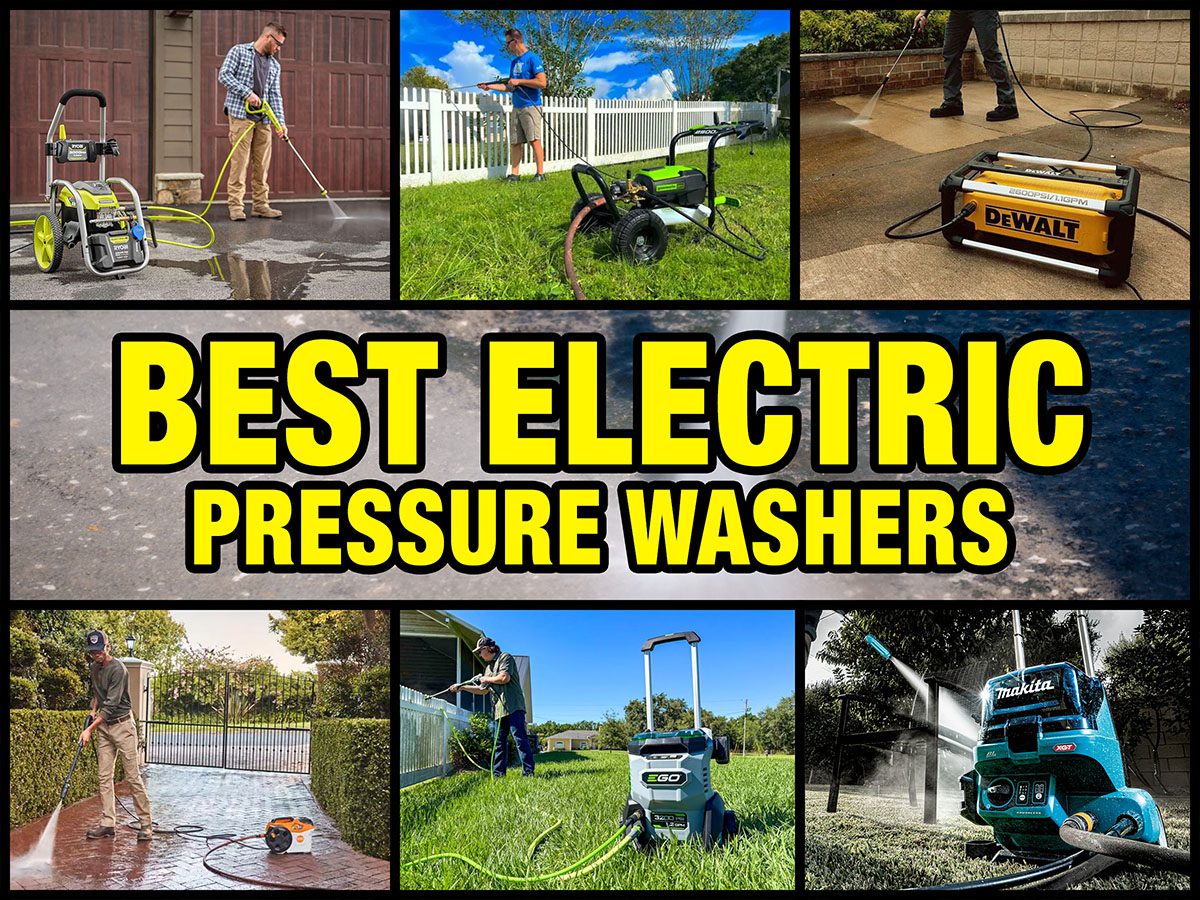Today’s best electric pressure washers have come a long way. Some have the power to legitimately compete with gas, while cordless options are becoming more viable than ever. Just in time for the spring cleaning season, I’m sharing the electric models that stand out from the crowd, recommendations from quality brands, and the most important things to consider while you’re shopping.
Considering gas models, too? Check out our main Best Pressure Washer recommendations page!
Best Electric Pressure Washer Top Picks
- Best Corded Electric: Ryobi 3000 PSI RY143011
↓ Jump to this Pressure Washer - Best Cordless: EGO 56V 3200 PSI HPW3200
↓ Jump to this Pressure Washer - Best Hybrid Electric: Greenworks 60V 3000 PSI PR3000HYB
↓ Jump to this Pressure Washer - Best Value: Ryobi 2000 PSI RY142022
↓ Jump to this Pressure Washer
Jump to These Sections
- Best Electric Pressure Washer From Other Brands
- What to Look for When You’re Shopping
- Why You Can Trust Pro Tool Reviews
Best Corded Electric Pressure Washer
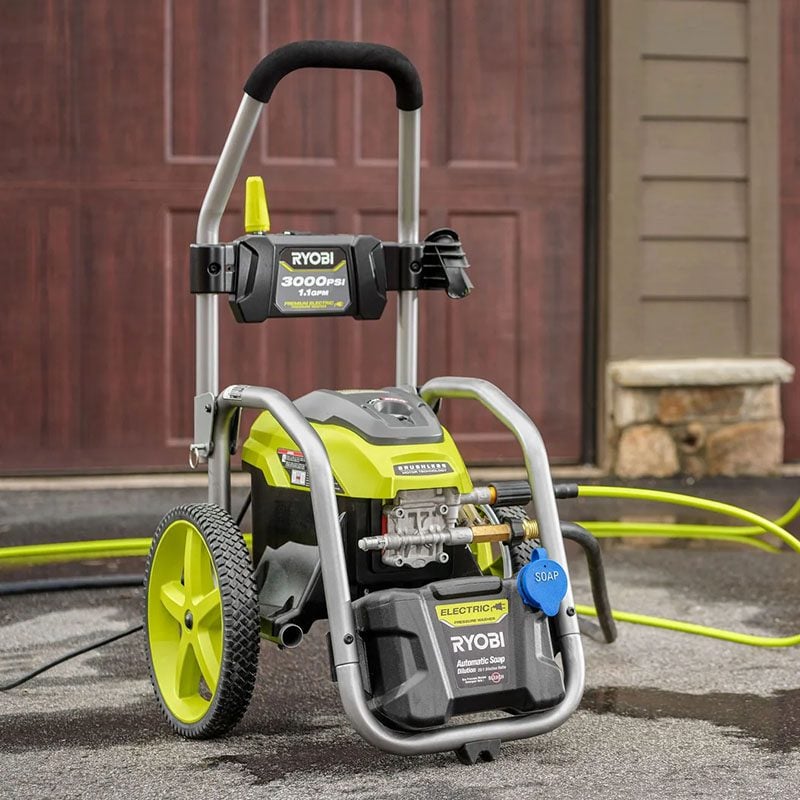
Ryobi 3000 PSI Brushless Electric RY143011
- Motor: 13A brushless
- Pump: Axial cam
- Maximum Pressure: 3000 PSI
- Flow Rate at Max PSI: 1.1 GPM
- Certification: PWMA
- Price: $399
- Warranty: 3 years
Pros
- High performance
- 5-in-1 nozzle
- Long 35-foot hose
- Large 12-inch wheels
- Lower price than other electric models with similar performance
- PWMA-certified performance
Cons
- Expensive
It’s been a few years since electric pressure washers finally hit the 3000 PSI performance mark, and Ryobi’s offers the best all-around package if you’re looking for a corded model.
Its high performance comes from a brushless motor—technology that also gives the motor a longer life than brushed models. Delivering 1.1 GPM at 3000 PSI, you get legit mid-range residential gas performance. While the flow rate isn’t quite as high as gas, you’ll notice how much faster you can clean whether you’re using a standard nozzle or surface cleaner.
The design is solid as well. The 35-foot hose reaches farther than the 25-foot ones that come with most electric models, keeping you from having to reposition as often. A 5-in-1 nozzle makes switching between spray patterns much easier. The large wheels are also great for rolling over both hard surfaces and grass.
Of course, better technology and higher performance come with a higher price tag, and at $399, the downside of this model is that it is out of reach of some budgets.
Best Cordless Electric Pressure Washer
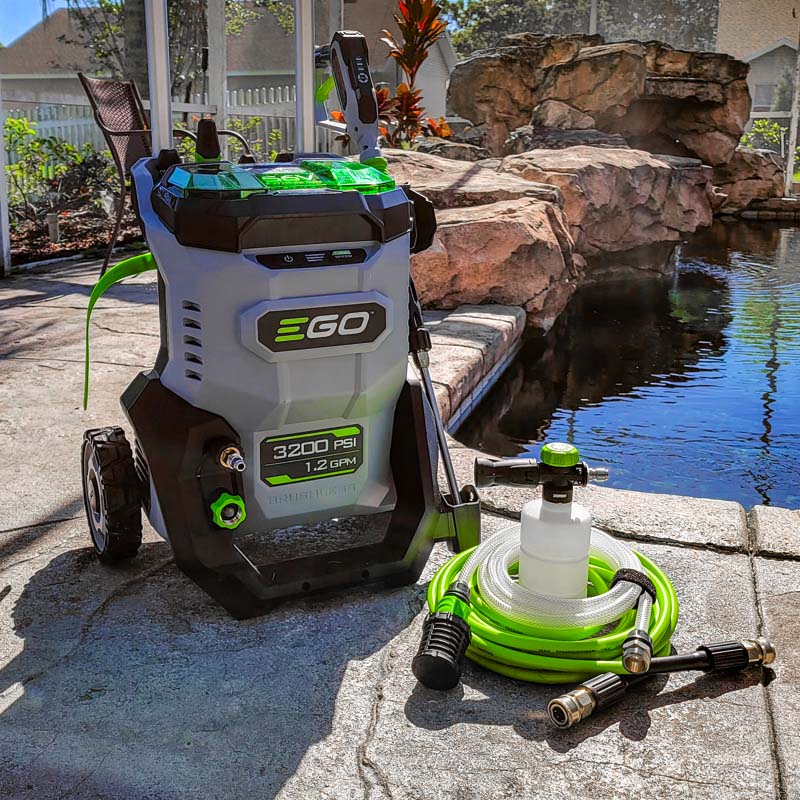
EGO 56V 3200 PSI Cordless HPW3200
- Motor: 56V brushless
- Pump: Axial cam
- Maximum Pressure: 3200 PSI
- Flow Rate at Max PSI: 1.2 GPM
- Certification: None
- Price: $499 bare, $699 kit
- Warranty: 5 years
Pros
- Highest electric performance
- Three modes
- Remote power controls on the wand
- Siphon hose capable (hose included)
- Telescoping handle
- Includes a foam cannon
- Batteries are compatible with all EGO 56 lawn care and lifestyle products
- Longer warranty than most
Cons
- Expensive
- Limited runtime
- Small wheels
You have to hand it to EGO; when they enter the market, they don’t do so quietly. Their first-generation cordless pressure washer left everyone else in the dust not only in performance but also with its innovative design.
Using two 56V batteries, it’s able to operate at higher power levels than 120V corded units. At 3200 PSI and 1.2 GPM, it’s the most powerful electric pressure washer short of jumping to the 240V corded class and going WAY up in price.
Managing battery runtime is a concern on any cordless pressure washer, and EGO accomplishes it with three power levels. In ECO mode, you can run up to an hour using two 6.0Ah batteries. What’s super-cool is that there’s a remote control built into the wand, so you can adjust on the fly to prioritize performance or runtime.
With a relatively compact housing for its brushless motor and pump plus a telescoping handle, the storage footprint is a bit smaller than most traditional designs.
One downside to the design is that it uses smaller wheels. The unit rolls great over hard surfaces, but it’s not as easy as large wheel designs on grass. The bigger hesitation for most folks is the price tag. Not everyone has the budget to afford this level of performance and technology. EGO doesn’t sweeten the value a bit by including a siphon hose and foam cannon, though.
Best Hybrid Electric Pressure Washer
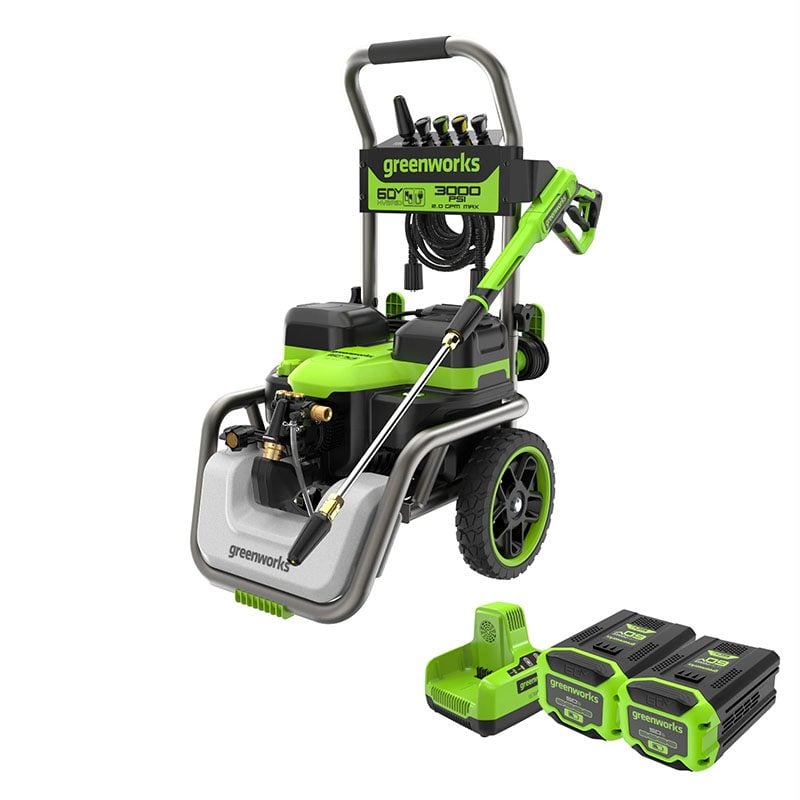
Greenworks 60V 3000 PSI Hybrid Electric PW3000HYB
- Motor: 60V brushless
- Pump: Axial cam
- Maximum Pressure: 3000 PSI
- Flow Rate at Max PSI: 1.1 GPM
- Certification: PWMA
- Price: $649
- Warranty: 4 years (10 years on the motor)
Pros
- High Performance
- Runs on battery or corded power
- Multiple modes to balance performance and runtime
- Large 10-inch wheels
- Siphon hose capable
- PWMA-certified performance
- Longer warranty than most
- Batteries work with all Greenworks 60V tools and lifestyle products
- Also available for the 80V battery system
Cons
- Expensive
If you want the best of both worlds, Greenworks’ 60V hybrid electric pressure washer is the way to go. Capable of using either 60V batteries or corded AC for power, you can choose between cordless convenience and unlimited runtime.
With 1.1 GPM at 3000 PSI, it shares the performance lead among corded models and has an ECO mode that steps down to 2200 PSI when you want to conserve battery power. You can also use a siphon hose if there’s no pressurized water source available.
There aren’t any surprises in the design. Greenworks maintains an open-frame style with this one, so it’s very familiar if you’re already used to electric pressure washers.
Price is the biggest concern for most shoppers. At $649.99 for the kit, this model has a premium price tag to go with its premium technology and performance. However, it does have a lengthy warranty to back it up.
Best Electric Pressure Washer for the Money
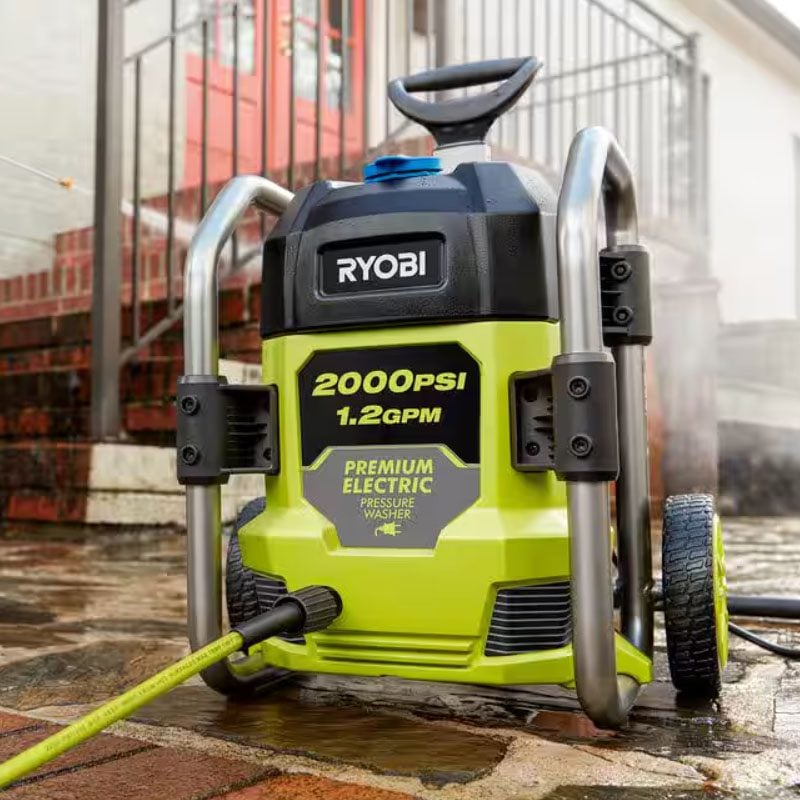
Ryobi 2000 PSI RY142022
- Motor: 13A
- Pump: Axial cam
- Maximum Pressure: 2000 PSI
- Flow Rate at Max PSI: 1.2 GPM
- Certification: PWMA
- Price: $199
- Warranty: 3 years
Pros
- Excellent value
- Compact storage footprint
- PWMA-certified performance
Cons
- Small wheels
- Doesn’t clean as fast as stronger models
If you’re looking to get the best pressure washer for your money, there are a lot of brands making cheap models trying to get your attention. I’d rather spend my money on a brand with a proven track record that I trust. $200 gets you a solid balance of price and performance from several of the manufacturers we recommend, and Ryobi’s RY142022 is the most appealing.
With 1.2 GPM at 2000 PSI, you have the cleaning power you need for nearly any household chores, including tackling driveways and sidewalks with a surface cleaner. That’s performance backed by a PWMA certification, and Ryobi doesn’t play games with PSI Max* and GPM Max* like some brands.
In addition to the performance for the price, I also like the design of this model. It stores all your accessories neatly and has a more compact storage footprint than most models.
The downside is that it has small wheels, so it doesn’t roll as easily over grass. On the other hand, it’s only 29 pounds, so it’s easy enough to carry if you need to.
Best Electric Pressure Washers From Other Brands
Best Craftsman Electric Pressure Washer
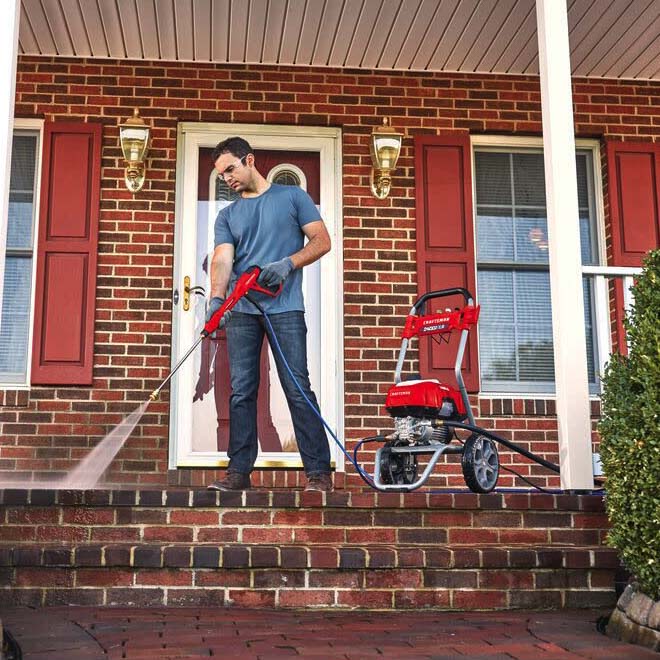
Craftsman 2400 PSI CMEPW2400
- Motor: 13A
- Pump: Axial cam
- Maximum Pressure: 2400 PSI
- Flow Rate at Max PSI: 1.1 GPM
- Certification: CETA
- Price: $249
- Warranty: 3 years
Pros
- Excellent performance for the price
- Large 10-inch wheels
- CETA-certified performance
Cons
- Doesn’t clean as fast as stronger models
If Craftsman is your brand, I like their 2400 PSI model the best. That might come as a surprise, considering there’s a strong 2800 PSI model available. For my money, it’s not enough of a performance gain to spend an extra $235, even though it does have a brushless motor.
Best DeWalt Electric Pressure Washer
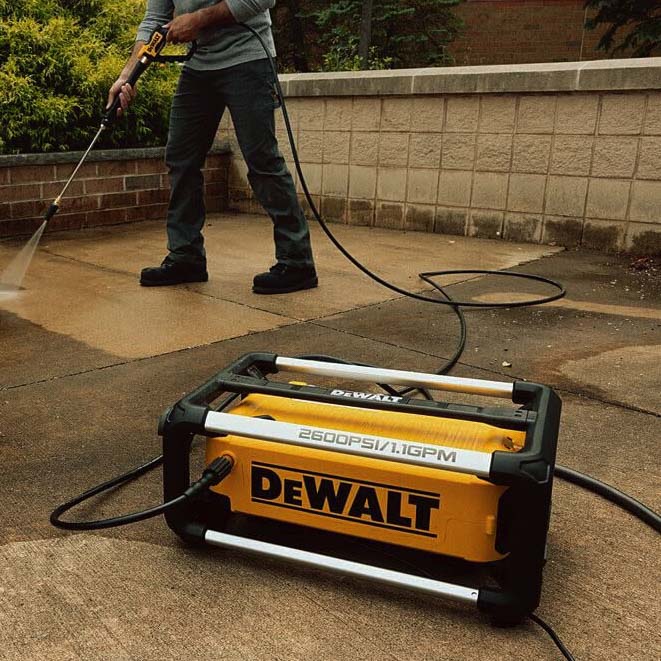
DeWalt 2600 PSI DWPW2600
- Motor: 13A
- Pump: Axial cam
- Maximum Pressure: 2600 PSI
- Flow Rate at Max PSI: 1.1 GPM
- Certification: CETA
- Price: $349
- Warranty: 3 years
Pros
- Compact, stackable frame design
- Innovative onboard storage design
- CETA-certified performance
Cons
- Ultra-small wheels
- Doesn’t clean as fast as stronger models
DeWalt shook things up a few years ago with a compact roll cage frame design (read the review), and I love how easy it is to throw in the back of a truck and transport. Now, there are three power levels sharing a similar design, and I prefer the balance of performance, size, weight, and price of the 2600 PSI model.
Best Makita Electric Pressure Washer
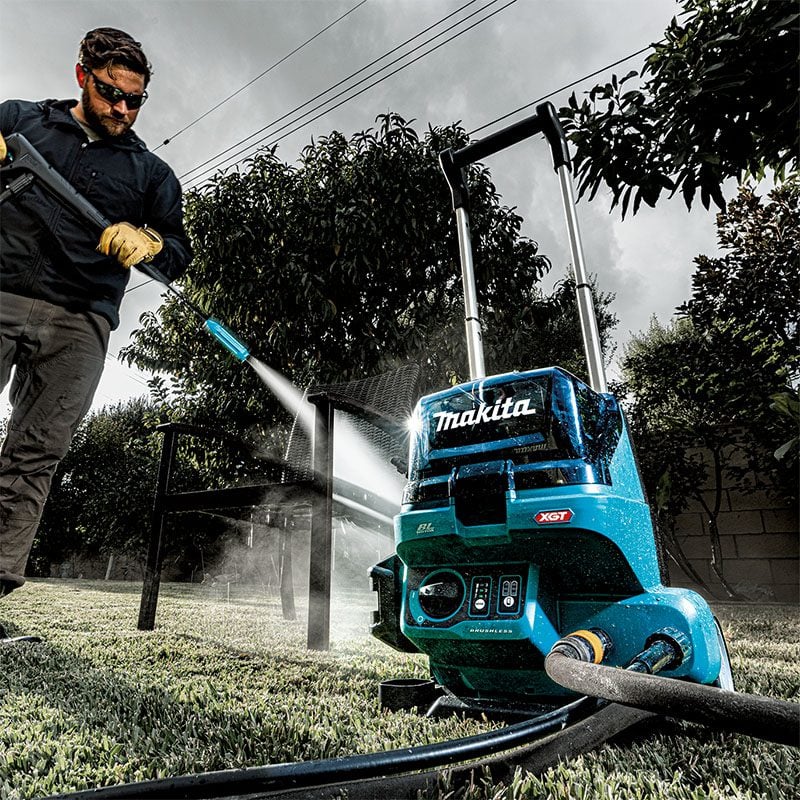
Makita 40V XGT 1300 PSI GWH01
- Motor: 40V max brushless
- Pump: Axial cam
- Maximum Pressure: 1300 PSI
- Flow Rate at Max PSI: 1.5 GPM
- Certification: None
- Price: $699 bare tool
- Warranty: 3 years
Pros
- Compact design
- Lightweight and easy to carry
- 3 power modes
- Siphon hose capable
- Variable angle nozzle
- Innovative onboard storage design
- Batteries are compatible with all Makita 40V max XGT products
Cons
- Small wheels
- Doesn’t clean as fast as stronger models
- Expensive
Makita’s first cordless pressure washer prioritizes higher GPM flow, speeding up cleaning in applications that don’t require high PSI levels. With three power modes to work in, it’s able to tone things down for vehicles or outdoor furniture that are easily damaged or jump up to high and tackle concrete cleaning. It’s also compact and lightweight (less than 25 pounds with batteries), making it a compelling choice for mobile detailers.
Best Simpson Electric Pressure Washer
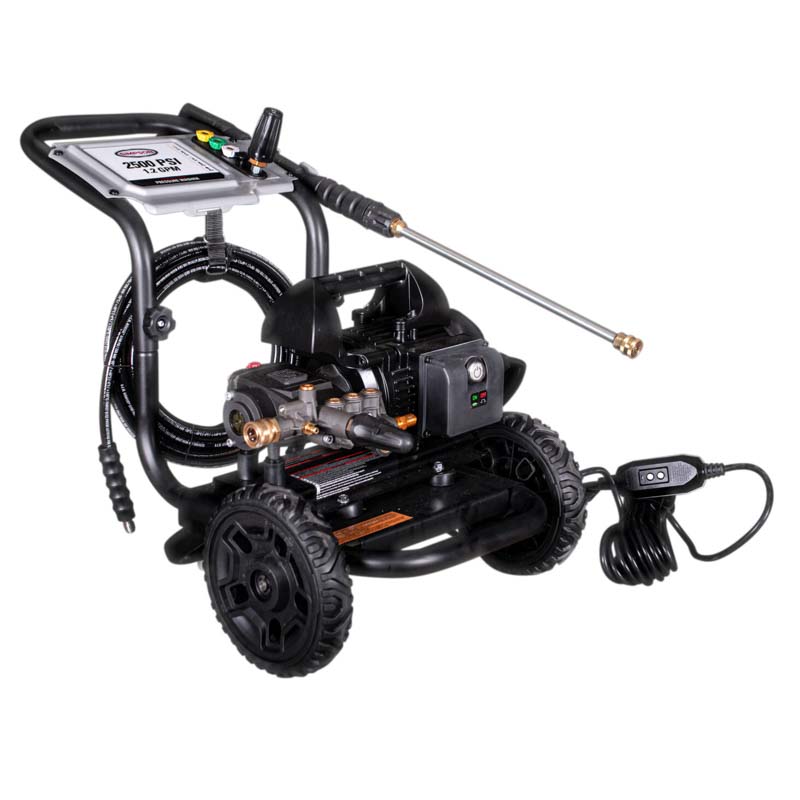
Simpson 2500PSI SE61297
- Motor: Brushless
- Pump: Triplex
- Maximum Pressure: 2500 PSI
- Flow Rate at Max PSI: 1.2 GPM
- Certification: CETA
- Price: $599.99
- Warranty: 3 years motor, 5 years frame and pump
Pros
- Commercial-grade triplex pump
- CETA-certified performance
Cons
- Expensive
- Doesn’t clean as fast as stronger models
It’s tough to go wrong with a Simpson pressure washer, and their commercial electric model is well worth your consideration. With 2500 PSI/1.2 GPM CETA-certified performance on the top end, it pairs high performance with a commercial-grade build, including a brushless motor and home-growth AAA triplex pump.
Best Stihl Electric Pressure Washer
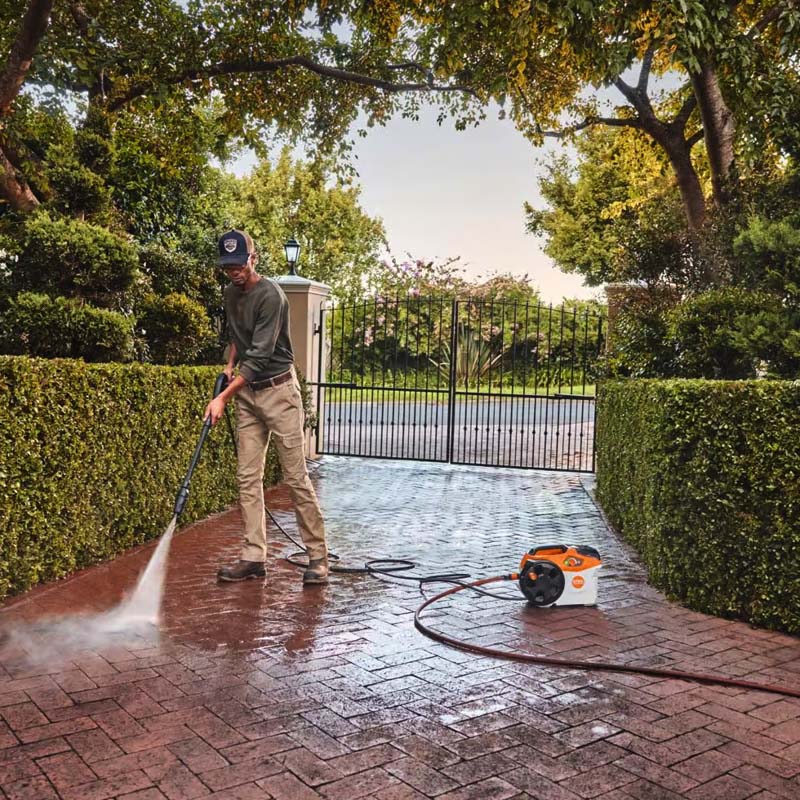
Stihl 2200PSI REA 100 Plus
- Motor: 36V
- Pump: Axial cam
- Maximum Pressure: 2200 PSI
- Flow Rate at Max PSI: 1.2 GPM
- Certification: None
- Price: $349.99 bare, $649.99 kit
- Warranty: 3 years motor, 5 years frame and pump
Pros
- Compact design
- Lightweight
- 3-in-1 nozzle
- Siphon hose capable
- Integrated hose reel
Cons
- Expensive
- Doesn’t clean as fast as stronger models
- Shorter hose than most
Stihl’s cordless pressure washer game is in its early stages, but the REA 100 Plus is currently the highest-performing model among its electric options. What makes it compelling is its super-compact design and integrated hose design. It’s expensive, like most cordless models, but it makes a good case for itself if storage space is an issue.
What to Look for When Buying an Electric Pressure Washer
Certified Performance (Watch Out for PSI Max*)
I’m not a fan of playing marketing games that make people think they’re getting something better than they really are. That’s why I really don’t like it when brands market PSI Max* and GPM Max*. Measured inside the machine, you’ll never experience these performance levels at the nozzle, but it lets some brands put a higher PSI and GPM number on their pressure washers.
Instead, look for PWMA or CETA certifications. These are organizations that set specific testing and reporting standards that guarantee we as consumers aren’t being duped.
Not every non-certified brand is guilty, though. One example is EGO. Even though their pressure washers aren’t certified (yet), they have a proven track record of delivering and often exceeding their claims.
DeWalt and Craftsman can be a little confusing. They use the term “PSI Max” in their specifications, but it’s not the same one some brands use that can deceive consumers. They’re specifically referring to the maximum PSI at the nozzle using a 15° nozzle as its reference point. Additionally, they’re both CETA-certified for their pressure washers.
Learn More:
- What is PSI Max on a Pressure Washer?
- Pressure Washer PSI That’s Too Good to Be True? It Probably Is!
Corded vs Cordless vs Hybrid
While electric pressure washers only came in corded versions for decades, now there are cordless and hybrid models available as well. Here’s a quick breakdown of the pros and cons of each:
Corded Electric Pressure Washers
Pros
- Unlimited runtime
- High performance potential
- Low maintenance
- Lower cost
Cons
- You’re tethered to a cord and two hoses
- You need a pressurized water source
Cordless Electric Pressure Washers
Pros
- Often has multiple modes to manage runtime
- Highest performance potential
- Low maintenance
- No need to find a power outlet
- Often can use a siphon hose
- Batteries are compatible with other lawn care products
Cons
- Limited runtime
- Higher cost
Hybrid Electric Pressure Washers
Pros
- Choose cordless freedom or unlimited runtime
- Often has multiple modes to manage runtime
- Highest performance potential
- Low maintenance
- No need to find a power outlet
- Often can use a siphon hose
- Batteries are compatible with other lawn care products
Cons
- Higher cost
Brushed vs Brushless Motors
The top-performing electric pressure washers all have brushless motors. This design offers higher performance, longer service life, and, in the case of cordless models, longer runtime. It’s not a small boost, either. These are massive benefits over brushed motors.
However, brushed motors are a great choice if your performance needs are more mid-range and you want to save some money. You can expect years of reliable service with very low maintenance requirements.
Axial Cam vs Triplex Pumps
Most electric pressure washers come with axial cam pumps, and there’s nothing wrong with that. Like brushed motors, they’ll give you years of service in most cases.
Triplex pumps are designed for the higher hours professional cleaners and commercial settings require. It’s a nice-to-have feature for anyone, but they typically only come with commercial-grade models with much higher price tags than residential models.
PSI vs GPM
Is PSI or GPM more important? PSI is the power that gets gunk moving, and GPM is the flow that carries it away. For most homeowners, focusing on the PSI you need is the first priority. Having a low GPM can make you slow down a little, but having too little PSI will make your work much slower. In some cases, it can even stop your progress if there’s not enough pressure to remove what you need to.
It can be tough to figure out which option among several pressure washers gives you the best cleaning power. There’s a relatively simple formula to compare them—just multiply the PSI by the GPM. Here are a few examples:
| Model | PSI | GPM | Cleaning Power |
|---|---|---|---|
| Model A | 2000 | 1.2 | 2400 |
| Model B | 2200 | 1.2 | 3640 |
| Model C | 2300 | 1.1 | 2530 |
Learn More:
Pressure Washer vs Power Cleaner
There’s a relatively new class of cleaning tools called power cleaners on the market, such as the Worx Hydroshot and Ryobi EZclean. These are incredibly convenient for cleaning a variety of things, especially considering you can connect a hose directly to them or use a siphon hose and a bucket of water.
The big difference between a pressure washer and a power cleaner is that pressure washers have much higher pressure. A power cleaner is fully contained in a tool not much larger than a pressure washer wand. Consequently, the components have to be smaller.
While pressure washers usually start at around 1500 PSI and go up from there, most power cleaners are 300–600 PSI. On the other hand, a power cleaner’s flow rate can be similar to that of an electric pressure washer.
Wheels
Most people tend to ignore the wheels on a pressure washer but give them a quick look while you’re shopping. Large-diameter or wide wheels roll much more easily over grass or bare ground. Pneumatic tires are also better for going over bumpy, rocky terrain.
If a pressure washer has small wheels, it’s not a deal-breaker. Many are light enough to easily carry if you need to. Others may have enough value in the performance or price to put up with some minor inconvenience.
Why You Can Trust Pro Tool Reviews
Ever check out a “review” site and you can’t tell if they actually tested the product or if they’re just “recommending” the Amazon top sellers? That’s not us. We won’t recommend anything unless we’d use it ourselves, and we don’t care who the primary retailer is. It’s all about giving you a legitimate recommendation and our honest opinion of each product.
Since 2008, Pro Tool Reviews has provided in-depth tool reviews, buying guides, how-to articles, and industry news in the construction and lawn care industries. We focus on professionals in the trades, and our writers have the skills and experience to know whether a tool or accessory will hold up on the jobsite.
Each year, we bring in and review more than 250 individual products. Additionally, our team will put their hands on hundreds more tools at media events and trade shows throughout the year. If I recommend a pressure washer, that means I’d use it myself (and perhaps I or one of our staff already does!)

